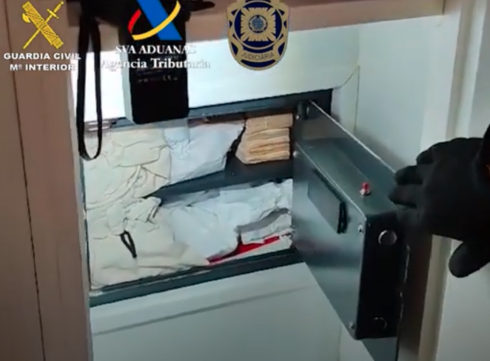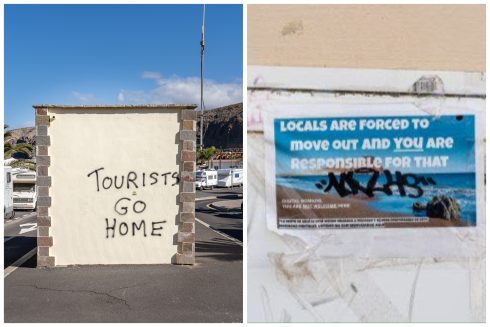As unprecedented numbers of sub-Saharan Africans arrive on the Granada coast, Lisa Tilley looks at Spain’s waterborne immigration trends and considers the future for the “paperless ones.”
They came from the sea…
“The latest wave of immigration has flooded this country with foreigners. As the torrent looks set to continue flowing, how can we stem the tide of this inundation?”
The media always use a distinctly watery discourse to speak of immigration, and this generic quote would be at home in newspapers across the developed world. The maritime lexicon of contemporary migration suggests migrants are somehow part of the very ocean, bobbing on the horizon until their time comes to be washed ashore.
At this present time in Spain, this aquatic analogy is actually partially true: the African migrants who come here arrive mostly across the sea.
Undocumented
The human beings who find themselves in Spain illegally are known here as sin papeles or those “without papers,” not so much a pejorative label but one which conjures images of absolute desolation – as if to be paperless is to be without a name, without identity, without existence.
The paperless ones, in their shabby dinghies, emerge from the water as alien to the prawn-skinned tourists lining the beaches as some unknown ethereal sea creatures.
Sin lágrimas para el compañero muerto (Without Tears for the Dead Companion) was the title of an El Pais report that told of how, when the migrants’ boats stumble to shore, they are filled with a mixture of the dead and half-dead.
However, the survivors do not weep for their friends – they are too traumatised even to reach their own emotions. Their trauma, of course, is a result of the epic journey they have endured, usually from Senegal to the very frontier of fortress Europe.
The poverty, conflict and malnutrition of sub-Saharan Africa may be a world away from the peace and economic wellbeing of Western Europe, but the conditions in the former are desperate enough to prompt young hopefuls to attempt the 2,000 plus kilometres from Africa to Spanish territory in simple boats.
The lion’s share go as far as the Canary Islands but some make it to mainland Spain: such as the 116 paperless ones who, on May 18, were intercepted off the coast of Granada and steered in to the port of Motril. This topped the previous week’s consignment of 70 seaborne arrivals in Granada.
When alerted, volunteers from the Red Cross wait to greet the arrivals with heavy apprehension – who will they find? In what condition? The most recent Motril dockings brought – among the usual demographic of young men – six women and two babies of only a few months old. The arrivals were fatigued, sun burnt and weather beaten, in need of medical assistance.
Some were taken to hospital, but all were glad to have made it alive.
Around 30,000 people were intercepted in their attempts to reach Spanish territory during 2006; 30,000 more are thought to have made the journey successfully but 6,000 hopefuls are estimated to have died at sea while trying. Those waves of migrants lapping Spanish shores have become tsunami-esque.
“Barca ou Barzakh”
Why do young Africans throw their lives to the fate of the sea? Their motivation is simple: “I don’t remember a time when we didn’t struggle to eat,” says Morgan, a Nigerian who has made multiple attempts to emigrate.
He also explained to the BBC all the migrants understand what they are dicing with – they are told that for every person who arrives successfully there is another who dies or is sent back.
Despite this, the journeys begin in a hopeful mood. “As the boat moved off, we began singing gospel music to keep our spirits up,” Morgan recalls.
Morgan has been sent back before, his boat had almost reached the Canaries when it was intercepted, and he has watched a number of companions die, if not at sea, then during the treacherous overland crossing to Senegal.
And in Senegal, migrants repeat the same simple mantra: “Barca ou Barzakh,” meaning Barcelona or the Afterlife – which would you choose?
Jobs at home
Spain is desperate to draw the curtains on this Greek-style tragedy, but various policy initiatives have done little to discourage the seafaring migrants. The government hopes that taking a hardline stance will keep the migrants at home: on May 20 of this year, they sent back 750 illegal immigrants, just days after surviving their harrowing journey to the Canary Islands, 600 of whom were Senegalese and 30 of whom were children.
While repatriating the paperless, the Spanish government will also try a new strategy: they plan to actively recruit 180,000 immigrants in their home countries. This, they hope, will keep the cogs whirring in an economy dependent on cheap labour; the recruits will do all the cherry-picking, brick-shifting jobs that Spaniards eschew for being too low-paid and back-breaking.
Direct recruitment also aims to undermine the trafficking gangs which feed off the migrants in predatory shoals. But the policy is already seen as flawed. The recruiters will not be concentrating on the main countries of origin in sub-Saharan Africa; instead, most of those hired will come from the Maghreb.
Those wishing to migrate from the departure points in Senegal will therefore be simply sent back.
At the same time, Frontex, the EU borders agency which piloted operations at the end of last year and is led by the Spanish Guardia Civil, will combine air and sea resources to intercept migrants’ boats. But while the agency awaits new equipment and the start of operations proper, there has been a sudden increase in attempted crossings.
If the three pronged attack of patrols, repatriation and recruitment reduces the numbers making the journey, the root cause of the problem will, of course, continue lingering in sub-Saharan Africa.
The truth remains that for many Africans, faced with the prospect of a lifetime of struggling even to eat, a watery death at sea is not even the worst option. And no amount of policy U-turns will discourage those who are, literally, dying to migrate.






